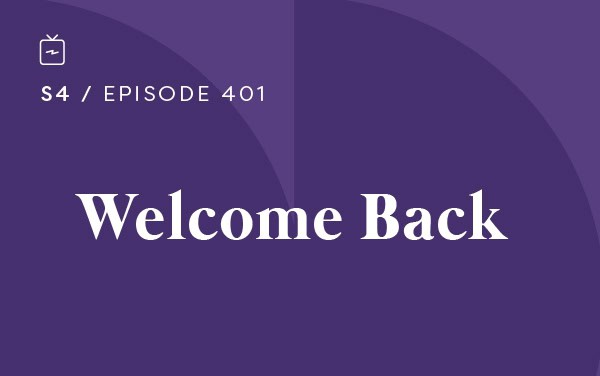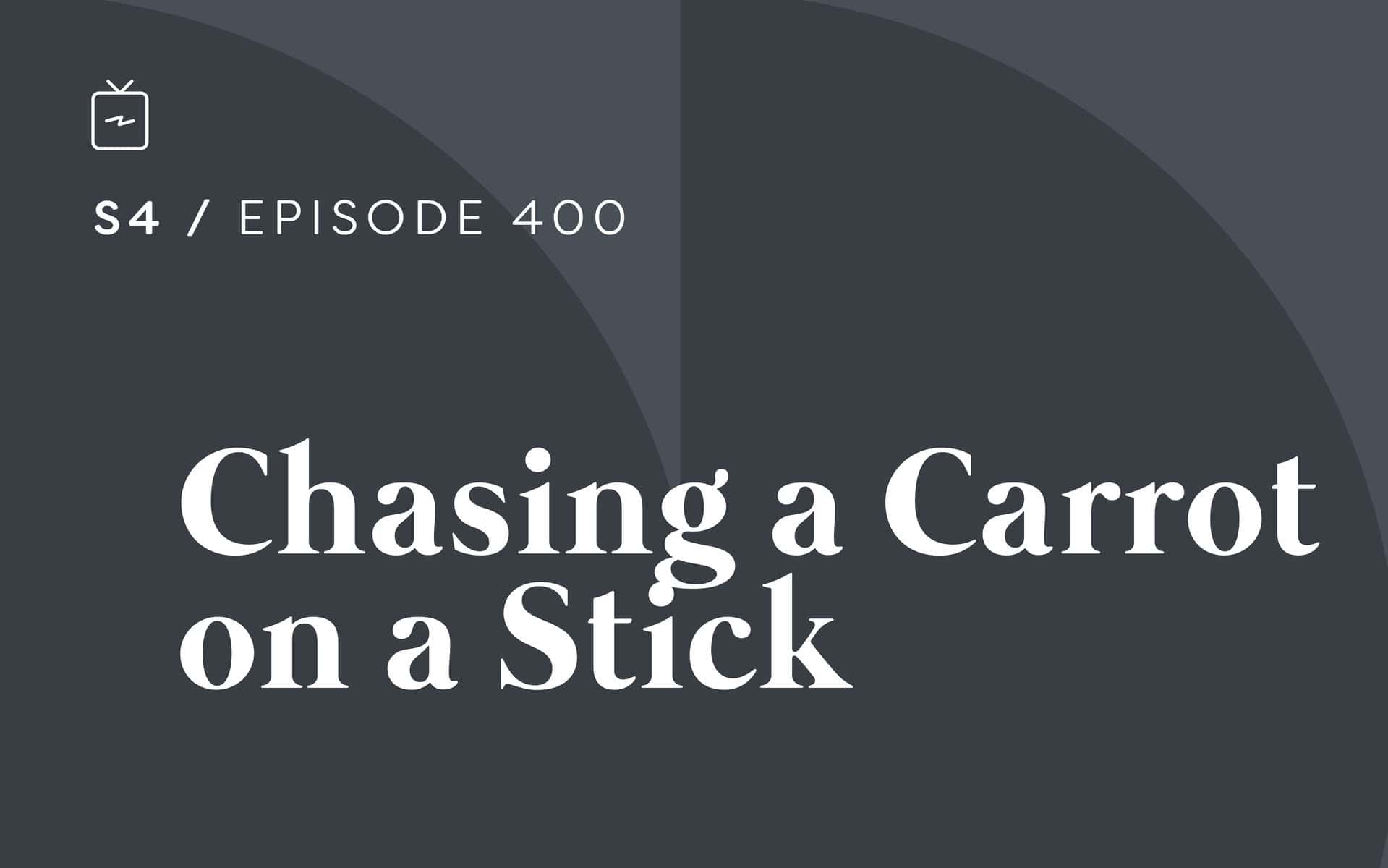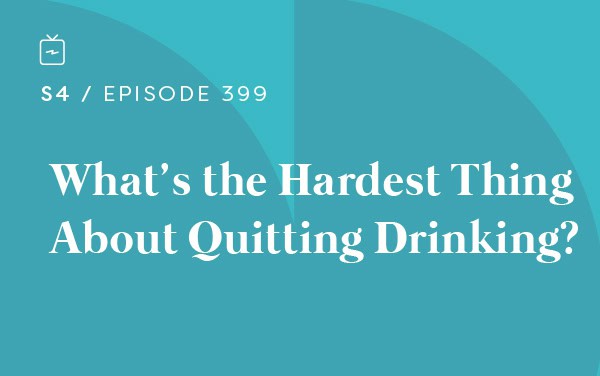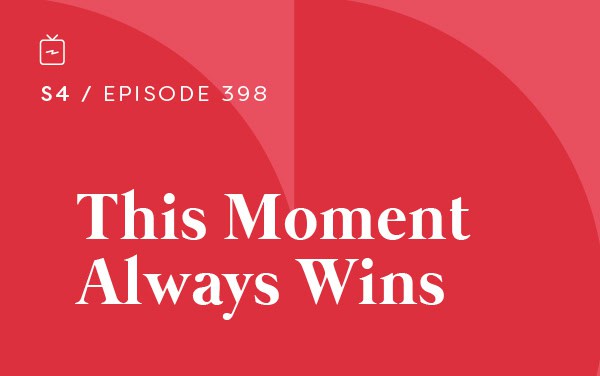
by Kris Oyen | Oct 24, 2022 | Podcast
Podcast: Play in new window | Download
Subscribe to the Recovery Elevator Podcast Apple Podcasts | | More
Episode 401 – Welcome Back
Today we have Jen. She is 52, from Connecticut, and took her last drink on March 10th, 2022.
Restore: https://www.recoveryelevator.com/restore/
Better Help: www.betterhelp.com/elevator – 10% off your first month. #sponsored
Highlights from Paul
In episode 391, Paul asked listeners what they wanted to hear. Jeff L, with 5 years
alcohol-free (That’s what’s up!) said he wanted to hear from past guests. Great idea Jeff
as we are also curious as to where they are now.
Paul gives updates from 15 past guests.
[20:30] Jen lives in Connecticut, has 2 kids (21 & 23), and just recently got a new job as a
counselor at a treatment center.
Jen had her 1st drink at 13 years old playing quarters, which resulted in her blacking out
and being sick for 3 days. She says that was a sign of what was to come and that
drinking was never fun for her. At 19 she started thinking she was an alcoholic and
became a daily drinker.
Jen was sober for 10 years (and then another 8 years). Those first 10 years were spent in
the rooms of AA and it took 7 years before she was able to get sober again.
After losing her husband suddenly to a heart attack in 2018 Jen started drinking. Again
Jen found herself going to treatment again (4 different treatment centers since her
husband died). Jen is now sober and back in the rooms of AA.
Musical submission from The Alex.
Upcoming events, retreats, and courses:
- You can find more information about our events
Resources
Connect with Cafe RE – Use the promo code OPPORTUNITY to waive the set-up fee.
Recovery Elevator YouTube – Subscribe here!
Sobriety Tracker iTunes
Recovery Elevator-
We are the only ones who can do this, but you don’t have to do it alone.
I love you guys.

by Kris Oyen | Oct 17, 2022 | Podcast
Podcast: Play in new window | Download
Subscribe to the Recovery Elevator Podcast Apple Podcasts | | More
Episode 400 – Chasing a Carrot on a Stick
Today we have Nick. He is from Vancouver, B.C, and took her last drink on December 7, 2018.
Recovery Elevator website: https://www.recoveryelevator.com/
Soberlink: https:///www.soberlink.com/
Highlights from Kris
Kris speaks to the crossroads of recovery. He acknowledges that so many new thoughts, podcasts, tools, mindsets, books, and videos on recovery. Then there is real life with an equal number of views, podcasts, and tools, on how to meet deadlines, be a great husband and father, a great worker, and a good friend.
With all these different concepts flying at us and life asking us to show up, how do you handle recovery and life simultaneously? For Kris, the crossroads show up often, and he has come to appreciate them as options. He has also learned that the best way to handle all possibilities is to sit with them, observe them and refrain from acting immediately. Krist describes this practice as combining mindfulness and refraining. Kris is working on finding peace and comfort where he is today. He will continue to take in new options and ideas but recognizes he doesn’t have to chase everything in front of him. When he can slow down, he can appreciate where he is. Kris can also acknowledge where he is feeling discomfort and focus on the pain rather than shifting his attention to something else.
Kris asks himself, “what am I doing with the time I have right now?” Kris encourages listeners to stay curious, act with intention, and show ourselves grace along the way.
Better Help: www.betterhelp.com/elevator – 10% off your first month. #sponsored
[9:02] Nick was on Episode 220 and has been sober for nearly four years. He is 36, married, lives in Vancouver, works at a university, and enjoys gardening because plants don’t talk back.
Growing up, Nick’s parents regularly drank with dinner, but not to excess. He had the occasional sip from his parent’s drink but wasn’t fascinated by alcohol. Nick remembers struggling with depression, anxiety, and feeling out of place at age 16. His peers seemed to have dreams and ambitions, and he was a mediocre student without aspirations. Alcohol took that anxiety away like a warm hug.
Alcohol helped Nick feel less awkward and became a gateway to who he wanted to be. Nick felt in control of his drinking until he moved to Vancouver, which became his primary comfort source. His father had a stroke, and that changed his life. He sought out ways to drink when he was away from his family. Slowly, he noticed his drinking progress until it felt like it consumed him, and he was out of control. At many points, he decided to quit, but each of those times, he had a lot of alcohol in his system, so the commitment was forgotten or ignored. He hated himself and his life, but outwardly he faked it as a functioning human. Alcohol was his only coping mechanism.
Nick joined Café RE in December, and it finally stuck. A Craig Ferguson monologue became an epiphany for Nick. He started seeing a therapist and began to process some of his issues. His drinking ramped up, but the seeds were planted to put the bottle down. Nick found the Recovery Elevator podcast and listened to stories until he could see the similarities. Recognizing others have done this and that there was hope helped him get through years of day one’s promises and trying different things.
Kris’s Summary
Kris thanks and congratulates Paul on 400 episodes. Kris has experienced healing and alignment with his values and can now be of service. This community is amazing, and its ripple effect is phenomenal.
Upcoming events, retreats, and courses:
- You can find more information about our events
Resources
Connect with Cafe RE – Use the promo code OPPORTUNITY to waive the set-up fee.
Recovery Elevator YouTube – Subscribe here!
Sobriety Tracker iTunes
Recovery Elevator-
We took the elevator down. We can take the stairs back up.
I love you guys.

by Kris Oyen | Oct 10, 2022 | Podcast
Podcast: Play in new window | Download
Subscribe to the Recovery Elevator Podcast Apple Podcasts | | More
Episode 399 – What’s the hardest part about quitting drinking?
Today we have Zita. She is 31, from Minnesota, and took her last drink on November 27, 2021.
Restore: https://www.recoveryelevator.com/restore/
Highlights from Paul
An AF life is overall better than drinking. The key word is overall. Quitting drinking is the hardest thing Paul has ever done, and, it’s the best decision he’s ever made.
Not quitting is harder on you than you realize. The domino effect of addiction cascades to your health, your relationships, your livelihood, and your sense of well-being. Those rock bottoms get worse and hit new depths that create despair, shame and helplessness. The decision to quit drinking can be harder when you don’t have those rock bottom moments, but you still have that voice in your head telling you, it’s time. Quitting isn’t easy, particularly in the beginning, but it has its own set of dominos, the path toward a better life.
The hardest part about quitting drinking isn’t the withdrawals or burning the ships. It’s entering the path of the unknown: infinite possibilities exist.
You can put the shovel down at any time.
Better Help: www.betterhelp.com/elevator – 10% off your first month. #sponsored
[12:26] Zita is an ICU nurse. She loves cooking, travel, rollerblading, movies, and getting her nails done. She is headed back to school to become a nurse practitioner.
Zita’s relationship with alcohol started in her early teens. She was a normal drinker through college. She drank a lot, but it never impacted her school, her relationships, or her ability to function. After college, she started working and a few years in she noticed having anxiety when she was around people which was a shift. After a breakup, she started using alcohol to cope with her emotions.
Zita’s family members spoke with her about her drinking, intervention style. She thought about slowing down but quitting never occurred to her at that point. Upon continued reflection, Zita realized she had some unprocessed trauma. She tried naltrexone, Antabuse and Women for Sobriety. Nothing was working. She shifted her approach to working on mental health and took a month off work and started DBT (dialectical behavioral therapy) treatment. Mental health support gave her new tools to shift her mindset. The first few months were hard and she nearly relapsed, but she gained some momentum.
Today, Zita feels great. She has gained assertiveness, confidence and learned to develop boundaries. She doesn’t have her “old self” back, she has a better life. Zita is proud that she has learned to manage her emotions more effectively. Looking forward, Zita is excited about graduating. She focused her education on mental health, and she looks forward to making broader contributions with her new knowledge.
Paul’s Summary
Paul believes you are about to bloom. Nobody exists without a purpose in the universe. Things under pressure produce new results; rocks under pressure become diamonds. The blooming has already begun.
[47:21] Musical submission from The Aquerials.
Upcoming events, retreats, and courses:
- You can find more information about our events
Resources
Connect with Cafe RE – Use the promo code OPPORTUNITY to waive the set-up fee.
Recovery Elevator YouTube – Subscribe here!
Sobriety Tracker iTunes
Recovery Elevator-
We are the only ones who can do this, but you don’t have to do it alone.
I love you guys.

by Kris Oyen | Oct 3, 2022 | Podcast
Podcast: Play in new window | Download
Subscribe to the Recovery Elevator Podcast Apple Podcasts | | More
Episode 398 – This Moment Always Wins
Today we have Adam. He is 30, from Vancouver, and took his last drink on February 8, 2013.
We have many upcoming events:
Costa Rica
For Info: https://www.recoveryelevator.com/events/
Highlights from Paul
Paul celebrated his eight-year recovery milestone and is thankful for all the support he gets from listeners, family, friends, and the Café RE community.
Paul’s insights include: alcohol is sh!t; addiction is an invitation to make a sweeping change in your life; burning the ships is part of the journey; the opposite of addiction is connection; focus on the wins; admit you are wrong when you need to, in real-time; you have to take action; don’t worry about the sobriety clock, keep doing the work; join the party – the AF movement is taking off; be kind to others, help others; be of service; leverage your drinking problem to expand your life; be mindful of the company you keep; there is nothing wrong with you; not drinking makes you a bad-ass;
Better Help: www.betterhelp.com/elevator – 10% off your first month. #sponsored
[13:26] Adam has been sober for nearly ten years. He is a personal trainer, nutritionist, breathwork therapist, mental health, and sober coach. He loves cold plunges, spending time in nature, traveling, and spending time with his dogs.
Adam grew up in Vancouver and was exposed to addiction early on. He was bullied a lot in high school, which led to anxiety, depression, and insecurity. He was 13 the first time he drank or smoked weed. He knew it wasn’t smart, but it gave him a sense of community. With a long family history of alcohol abuse, Adam knew he was in trouble the first time he drank.
Adam got his apartment and car at age 15. He made poor decisions, including steroids, drinking, cocaine, being in a gang, and smoking. After a death threat, he moved to another province, got a job, and his drug use escalated. He sold drugs, and it was attractive to him at the time. He was stabbed during a fight. At 16, a buddy of his died in his arms. Steroid use caused Adam to default to anger frequently. He was aggressive. Adam said it took at least ten wake-up calls before he was ready to address his addiction. He was exposed to a lot of violence and death with the people he spent time with. At 19, during a drug deal, he was kidnapped and held captive by some bad people. During that incident, he had an out-of-body experience. When he was released, he was hospitalized. He crashed when in the hospital. A spiritual awakening occurred for Adam. Adam described it as powerful, and it continues to inspire him to live a better life. The last time he used it was on his 21st birthday. He called his Mom, and she let him come home.
The first two years of sobriety were the hardest for Adam. He had lots of PTSD from his gang experience. He had two suicide attempts. Adam went to his first AA meeting. A person said to him, “If you kill yourself today, you are killing the wrong person because you don’t know the person who you can become.” Breathwork became a big part of his recovery. Learning to accept and demonstrate his emotions was challenging, but Adam continues to learn to manage his feelings. He worked the steps. He saw a psychologist/neurologist and was diagnosed with severe brain injury, PTSD, anxiety, and depression. None of the medications helped. Breathwork and exercise help him manage his anxiety and depression.
[57:50] Kris’ Summary
After a rough week, Kris remembered, “you don’t have to get sober for the rest of your life today.” Trust the process.
Upcoming events, retreats, and courses:
- You can find more information about our events
Resources
Connect with Cafe RE – Use the promo code OPPORTUNITY to waive the set-up fee.
Recovery Elevator YouTube – Subscribe here!
Sobriety Tracker iTunes
Recovery Elevator-
We are the only ones who can do this, but you don’t have to do it alone.
I love you guys.

by Kris Oyen | Sep 26, 2022 | Podcast
Podcast: Play in new window | Download
Subscribe to the Recovery Elevator Podcast Apple Podcasts | | More
Episode 397 – The Ultimate Connection
Today we have Santino. He is 43, from Massachusetts, and took his last drink 43 days ago.
We have many upcoming events:
AF Photo Class
Restore
Regionals
Ukulele
Costa Rica
For Info: https://www.recoveryelevator.com/events/
Highlights from Paul
Paul shares that our actions are felt for seven generations in our lineage. When you quit drinking, do the inner work, the ripple effect can last 150 years.
Eckhart Tolle defines love as recognizing oneness in a world of duality. The ego craves separation, judgements. When we are drinking, we are reinforcing that divide. The worst side effect of alcohol is isolation. But when we drop the bottle, we give ourselves a chance to find love, or maybe let love find us.
Congratulations Dusty and Lotus on your recent nuptials.
Love yourself and love yourself first. Love in recovery can be rediscovering nature, it can be planting a garden, it can be zipping around on a one wheel, it can be learning a new instrument, picking up an old instrument. It can be laughter.
Make sure to stay tuned to the end of the episode. Our outro music is from one of our Café Re members, Ron.
Better Help: www.betterhelp.com/elevator – 10% off your first month. #sponsored
[9:50] Santino works for a nonprofit homeless organization; he is married with a son and enjoys being a father.
Being present, in the moment and the ability to remember the moment are the early perks of sobriety for Santino. His first taste of alcohol was at age 10. He took a sip of his Dad’s drink and enjoyed the taste.
Paul and Santino discussed how college culture and military culture both celebrate drinking. Santino said his drinking was normalized because of the culture of drinking in the military. His wake up calls around drinking came when he left the military. He got his first DWI and went to court ordered AA. He drank before and after the meetings.
Santino noticed a pattern of lying, about all kinds of things, but particularly about what he was drinking, when and how much. AA is now part of his life. He has learned to say “alcoholic” to be accountable for what was happening with him. He is well informed about withdrawal and his most recent experience was painful and a reckoning. Santino encourages listeners to be honest with themselves. Give yourself grace AND accountability. He did a 72 hour fast. He listens to the Recovery Elevator podcast. He burned the ships with his childhood friend, his sister and his wife.
The Uvalde shooting had a major impact on Santino and became an impetus for him to quit drinking.
[55:20] Paul’s Summary
Paul introduces Ron who is a musician who wrote and performed today’s outro music.
[56:51] We walk each other home.
Upcoming events, retreats, and courses:
- You can find more information about our events
Resources
Connect with Cafe RE – Use the promo code OPPORTUNITY to waive the set-up fee.
Recovery Elevator YouTube – Subscribe here!
Sobriety Tracker iTunes
Recovery Elevator-
We took the elevator down. We need to take the stairs back up.
I love you guys.







